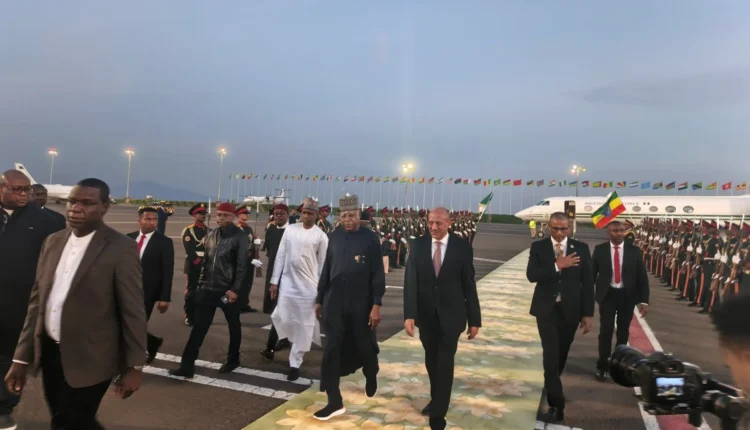Shettima arrives Addis Ababa for UN food summit
Vice-President Kashim Shettima, has arrived in Addis Ababa, the Ethiopian capital, to participate at the second United Nations (UN) Food Systems Summit holding from July 27 to 29.
The Voice Media Trust (VMT NEWS) reports that the vice-president’s aircraft touched the ground around 4:26p.m. local time, at the Addis Ababa Bole International Airport
He was received by the Deputy Prime Minister of Ethiopia, Temesgen Tiruneh, the Chargé d’Affaires of the Nigerian Embassy, Ethiopia, Amb. Nasir Aminu, Dr Suleiman Dauda Finance Attache’, Wing Commander Gabriel Batubo, Deputy Defence Attache (Air Force) to Ethiopia.
Others were the Deputy Head of mission, Amb. Macy Ogbede, First Secretary, Mr Jangado Ishaku, and other top officials of the embassy.
The vice-president was briefed about the itinerary of the summit by the Chargé d’Affaires of the Nigerian Embassy, Ethiopia, Amb. Nasir Aminu, Marion Moon, Technical Assistant to the President on Agriculture and Executive Secretary of the Presidential Food Systems Coordinating Unit (PFSCU).
Read Also: World Cup Qualifiers: Bafana Bafana to host Super Eagles Sept. 9
Shettima would join global leaders at the high-level event on advancing the transformation of the coffee value chain, roundtables and meetings aimed at bolstering Nigeria’s food security drive.

Similarly, Shettima would also participate in other events on the sidelines of the summit designed to spotlight real-world examples of food systems transformation, promote knowledge exchange and partnership.
VMT NEWS reports that the summit would bring together global leaders to reflect on progress made since the inaugural 2021 UN Food Systems Summit and accelerate commitments towards building resilient, inclusive, and sustainable food systems.
The summit will build on the momentum of the 2021 UN Food Systems Summit and the first Stocktake in 2023 (UNFSS+2), focusing on accelerating sustainable, inclusive, and resilient food systems transformation.
The event will spotlight successful country-level transformations, highlight innovative practices, and address challenges faced in fragile and conflict-affected settings.
It will also be part of broader efforts to shape a coherent global narrative on sustainable development and accelerate synergies between key SDG transitions.

